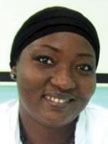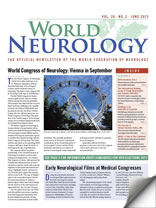I am from Niger, the country where I grew up, until earning my high school diploma. Thereafter, I pursued my doctoral cycle of general medicine at the University Hassan II in Casablanca (Morocco). Returning to Niger, I worked as a general practitioner at the National Hospital of Niamey. Then I decided to specialize in Neurology, a subject that attracted me for its rigor and finesse during my medical training.
Moreover, the critical shortage of neurologists in Niger (a neurologist to 15 million inhabitants) and the frequency of neurological disorders have further strengthened my desire to study the Neurosciences.
My ambition and motivation are even larger as I would like to get involved in teaching and research. This could help to improve the teaching of Neurosciences and participate in the improvement of this practice in my country.
To achieve these goals, I decided to do my training in Senegal at Cheikh Anta Diop University, well known in French-speaking Africa for its quality and serious background in the training of qualified medical practitioners. Senegal has an epidemiological framework quite similar to the Niger.
The initial training based on core subjects (neuroanatomy, neurophysiology, neurobiology, neuropathology and semiology) was of great interest to the rest of the program. Subsequently, neurological pathology and explorations (electrophysiology, neuroimaging) was easier to assimilate. The planning of these various teachings is based on continuous programming, seminars, visits and hospital meetings.
In addition, participation in various Congress: Regional Teaching Courses in Cameroon in 2011, the 20th World Congress of Neurology in Marrakech (Morocco) and the 1st African Epilepsy Congress in Kenya has been very rewarding. The event that impressed me most was our participation in the semifinals of the “Tournament of Minds” during the World Congress of Neurology in Marrakech.
The key items to success in my specialization are the good atmosphere among trainees in neurology and accessibility of our teachers.
However, the low level of literacy among patients is a limit for a good clinical examination. Moreover, the lack of financial resources is a problem for achieving explorations.
For my final year of specialization I did an internship at Rabat’s Hospital (Morocco) in the Department of Clinical Neurophysiology, where I had the opportunity to see heritable genetic diseases (Charcot-Marie-Tooth neuropathy, progressive spinal atrophy, sarcoglycanopathy), which are much more rare in Senegal.
My experiences in Morocco and Senegal have allowed me to meet many colleagues from various backgrounds including Mali, Burkina Faso, Senegal, Cameroon, Tunisia, Gabon, Madagascar, Mauritania, Congo, Benin, Morocco, Comoros, and the Central African Republic. Talking to people from different countries has helped me to gain a broader socio-cultural and scientific vision and is a key point for the organization and the rooting of Neurosciences in Africa.
On my return to Niger after specialization, I expect to be assigned to the National Hospital of Niamey in internal medicine. My short and medium term projects would be to organize a medical neurology department in Niger with a clinical neurophysiology unit. I wish to promote information and education of the population on the major neurological diseases (epilepsy, stroke, headaches). My ideal in the long term is to have diagnostic procedures available (imaging, electrophysiology) and therapeutic capabilities (stroke unit, functional rehabilitation). In addition, I intend to encourage and facilitate the orientation in neurology for younger generations of doctors. Finally, it is important to encourage the creation and / or enhancement of activities against chronic neurological disorders such as epilepsy.
All these ambitions would be more successful in an exchange framework beyond borders. That’s the whole point of having sub-regional training centers involving various nationalities.
On a cultural point of view such a challenge for a woman (because in my country we don’t usually have leading roles), appears to be one of the biggest challenges. But with will, nothing is impossible.

